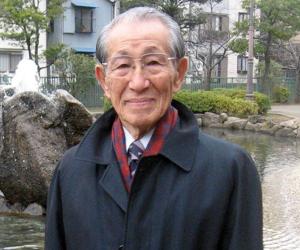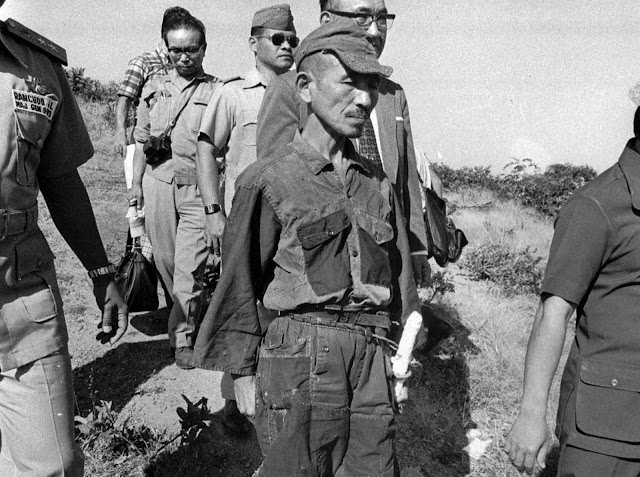“To this
soldier, duty took precedence over personal sentiments. Onoda has shown us that
there is much more in life than just material affluence and selfish pursuits.
There is the spiritual aspect, something we may have forgotten.” The
Mainichi Shimbun, a Tokyo newspaper.
Hirō "Hiroo" Onoda was an
Imperial Japanese Army intelligence officer who remained
at his jungle post on an island in the Philippines for 29 years, refusing to
believe that World War II was over. Onoda spent 29 years
hiding out in the Philippines until his former commander traveled from Japan to
formally relieve him from duty by order of Emperor Shōwa in 1974. (Another
holdout, Teruo Nakamura, surrendered later
in 1974.)
Lieutenant Onoda, an
intelligence officer trained in guerrilla tactics, and three enlisted men with
him found leaflets proclaiming the war’s end, but believed they were enemy
propaganda.
Onoda trained as an
intelligence officer in the commando class "Futamata, was sent to Lubang
Island and was ordered to do all he could to hamper enemy attacks on the
island, including destroying the airstrip and the pier at the harbor. Onoda's
orders also stated that under no circumstances was he to surrender or take his
own life.
Onoda’s last order in
early 1945 was to stay and fight. Loyal to a military code that taught that
death was preferable to surrender, he remained behind on Lubang Island, 93
miles southwest of Manila, when Japanese forces withdrew in the face of an
American invasion.
Onoda, who had been promoted to
lieutenant, ordered the men to take to the hills. They command built bamboo huts,
pilfered rice and other food from a village and killed cows for meat; they were
tormented by tropical heat, rats and mosquitoes, and they patched their
uniforms and kept their rifles in working order.
Considering themselves to
be at war, they evaded American and Filipino search parties and attacked islanders
they took to be enemy guerrillas. One of
the enlisted men, Yuichi Akatsu, left the others in 1949,
and surrendered to Filipino forces in 1950 after six months on his own.
This seemed like a security
problem to the others and they became even more cautious. In 1952 letters and
family pictures were dropped from aircraft urging them to surrender, but the
three soldiers concluded that this was a trick.
Another man, Shimada, was shot in the
leg during a shoot-out with local fishermen in June 1953, after which Onoda
nursed him back to health. On 7 May 1954, Shimada was killed by a shot fired by
a search party looking for the men. Enlisted man Kozuka was killed by two shots
fired by local police on 19 October 1972, when he and Onoda, as part of their
guerrilla activities, were burning rice that had been collected by farmers.
Onoda was now alone. He was officially declared
dead in 1959.
In 1974, Onoda was found by
Norio Suzuki, a student who was traveling around
the world, looking for "Lieutenant Onoda, a panda, and the Abominable
Snowman, in that order"
Suzuki found Onoda after four
days of searching. Onoda recalled "This hippie boy Suzuki came to the
island to listen to the feelings of a Japanese soldier. Suzuki asked me why I
would not come out ..."
Onoda with Norio Suzuki, 1974
However the lieutenant rejected Suzuki’s pleas
to go home, insisting he was still awaiting orders. Suzuki returned with photographs, and the
Japanese government sent a delegation, including lieutenant Onoda’s brother and his former
commander, Major Yoshimi Taniguchi, who had since become a
bookseller, to formally relieve him of duty. Taniguchi met with Onoda and fulfilled a promise he had made back
in 1944: "Whatever happens, we'll come back for you".
Onoda turned over Arisaka Type
99 rifle, 500 rounds of ammunition and several hand grenades, as well as the
dagger his mother had given him in 1944 to kill himself with if he was
captured.
In Manila, lieutenant
Onoda, wearing his tattered uniform, presented his sword to President Marcos,
who pardoned him for crimes (Murder and shoot outs with national police. Onoda
he and his comrades had killed about 30 Filipinos after World War II ended) committed
while he thought he was at war.
Onoda was already a
national hero when he arrived in Tokyo, for his patriotism and admiration for
his grit. He was met by his aging parents and huge flag-waving crowds. “I am
sorry I have disturbed you for so long a time,” Onoda told his brother,
Toshiro.
His story dominated the
news in Japan for days, evoked waves of nostalgia and melancholy. Japan fell
further in love with the 52-year-old soldier when he spoke earnestly of duty
and seemed to personify a devotion to traditional values that many Japanese
thought had been lost. “I was fortunate that I could devote myself to my duty
in my young and vigorous years,” he said. Asked what had been on his mind all that
time in the jungle, he said, “Nothing but accomplishing my duty.”
After his national
welcome in Japan, Onoda was examined by doctors, who found him in amazingly
good condition. He was given a military pension and signed a $160,000 contract
for a ghostwritten memoir, “No Surrender: My-Thirty Year War.”
They New York Times described his
return perfectly when it wrote “Caught in a time warp,
Mr. Onoda, a second lieutenant, was one of the war’s last holdouts: a soldier
who believed that the emperor was a deity and the war a sacred mission; who
survived on bananas and coconuts and sometimes killed villagers he assumed were
enemies; who finally went home to the lotus land of paper and wood which turned
out to be a futuristic world of skyscrapers, television, jet planes and
pollution and atomic destruction.”
The Japanese
government offered him a large sum of money in back pay, which he refused. When
money was pressed on him by well-wishers, he donated it to Yasukuni Shrine.
Onoda was overwhelmed
with all the attention and was troubled by what he saw as the withering of
traditional Japanese values. In April 1975, he followed his elder brother Tadao
and left Japan for Brazil, where he raised cattle.
He married in 1976
and assumed a leading role in Colônia Jamic (Jamic Colony), the Japanese
community in Terenos, Mato Grosso do Sul, Brazil. Onoda also allowed the
Brazilian Air Force to conduct trainings in the land that he owned.
After reading about a
Japanese teenager who had murdered his parents in 1980, Onoda returned to Japan
in 1984 and established the Onoda Shizen Juku ("Onoda Nature School")
educational camp for young people, held at various locations in Japan.
Onoda revisited
Lubang Island, where he had held out, in 1996, donating $10,000 (US) to the
local school there. For many years, he
spent three months of the year in Brazil where he was awarded the Merit medal
of Santos-Dumont by the Brazilian Air Force on 6 December 2004. On February 21,
2010, the Legislative Assembly of Mato Grosso do Sul awarded him the title of
Cidadão ("Citizen").
Onoda
died of heart
failure on January 16, 2014, at St. Luke's International Hospital in Tokyo, due
to complications from pneumonia

A few months after Lt. Onoda
came in from the jungle, Japanese Private Teruo Nakamura was found on December 18, 1974 in Indonesia, but his
story was much different from Onoda’s. Nakamura, an Amis aborigine, was a
Taiwanese soldier from the Imperial Japanese Army who fought for Japan in World
War II.
Nakamura was enlisted into a
Takasago Volunteer Unit of the Imperial Japanese army in November 1943. He was
stationed on Morotai Island in Indonesia shortly before the island was overrun
by the Allies in September 1944 in the Battle of Morotai.
Nakamura was declared dead on
November 13 1945 by the Imperial Japanese army. However, he was very much alive
and lived with other stragglers on the island until well into the 1950s, while
going off for extended periods of time on his own. In 1956, he apparently
decided to cut himself off from the remaining holdouts on the island and built
his own, fenced camp.
Nakamura's hut was accidentally
discovered by a pilot in mid-1974. At
the request of the Japanese Embassy in Jakarta the Indonesian government
organizing a search mission, which was conducted by the Indonesian Air Force on
Morotai. Nakamura was found and, unlike Onoda was arrested and handcuffed by
Indonesian soldiers on December 18, 1974.
He was flown to Jakarta and hospitalized
and repatriated to Taiwan.
The Taiwanese Kuomintang government downplayed his return
because they considered Nakamura a Japanese loyalist. A change in
the Japanese law in 1953, essentially stripped him of his pension and back pay
but did grant him about $1,200 a month to live on. His wife, assuming that
Nakamura had died, had long since remarried. His son was a stranger to
him.

Private Nakamura died of lung
cancer in Taiwan, five years after he left the jungle, on 15 June 1979.







